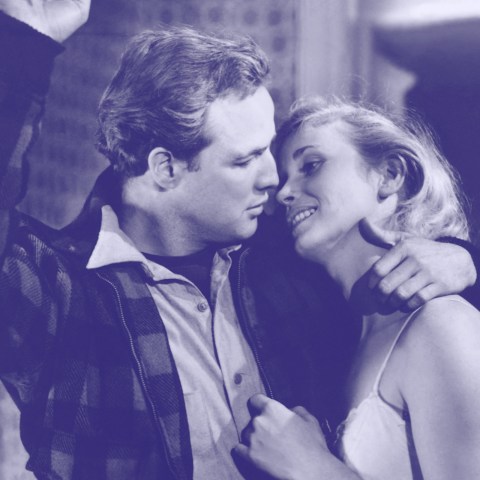Dating apps can be useful tools for finding a mate, but by limiting the scope of one’s prospects they limit one’s capacity to love.We like whom we like for all sorts of reasons. Some of them, like physical attractiveness or sense of humor, we understand, while others, like a quirky habit or endearing laugh, we don’t. It’s usually the latter—the strange oddities that reveal a significant other’s inimitable humanness—that sweep us off our feet. But since these discrete qualities are much harder to identify, we are usually left only considering the more obvious traits when initially searching for a romantic match. That’s exactly where modern dating apps and websites can play a part in helping many identify and pursue their “type.”
An article in The Atlantic, “Spotify Is Trying to Become the Music Platform of Modern Dating,” highlights another possible point of convergence for single people looking for a compatible companion. Tinder users can label a song their “Tinder Anthem,” allowing potential matches to play the song through Spotify. Additionally, Tinder users can see if a possible match shares the same taste in music by perusing their Spotify playlist. So, someone who likes broody acoustic or fringy electronic might be worth considering as a possible match.

Read more:
‘The Dating Project’: Why this professor makes her students go on dates
This reminds me of a film that came out a little while back, titled The Lobster, featuring Colin Farrell and Rachel Weisz. The film casts an interesting—and at times disturbing—glance at the notions of compatibility, singleness, and human love. In the dystopian film, single people are required to find a “reasonably” compatible mate in order to avoid being irrevocably turned into an animal of their choosing (like, for example, a lobster). In the film, the uncoupled are taken to a hotel outside of an unnamed city where they are given a limited amount of time to find a mate so that they may be reintroduced into society. With stiff characters set in an eerie setting, the film aggressively takes the form of a dark comedy. The unfortunate singles, due to their fear of being mysteriously altered (the film implies this is done through some type of medical procedure and not occult magic) into an animal, are forced into wresting a suitable mate based on the most trivial of shared traits, such as nearsightedness or regular nosebleeds. A sharp and focused lens is placed over our culture’s current customs regarding dating and relationships, forcing us to examine how we go about pursuing another person and what motivations and fears we might unknowingly be harboring.
The modern dating scene, which often employs the help of complex algorithms, allows us to find matches based on a list of prescribed traits. Like the dreary hotel in The Lobster, dating sites and apps provide a type of virtual venue where we can search for like-minded and like-hearted matches. This raises an important question, however: how has the modern dating scene, and the role technology plays within it, affected our understanding of love? Or more specifically: How has our modern take on relationships, both romantic and not, affected our ability to fulfill the command to love our neighbor?
It’s worth exploring why we are drawn to certain characteristics or traits in another, which modern technology is constantly trying to identify and satisfy. In an NPR story, “Why Do We Like What We Like?,” Paul Bloom, a professor of psychology at Yale University and author of How Pleasure Works, explains that “essence affects not just how we think about things and talk about things, but how much we like things.” By “essence,” he means the meaning we attribute to something.
For example, we enjoy a glass of Cabernet Sauvignon or a slice of cheesecake more if we’re told that the wine is very expensive or that a world-renowned chef prepared the cheesecake. The meaning associated with these two things becomes one of “excellence” or “world-class,” which greatly colors our experience of consuming them. When we attribute meaning to the object in question—be that a work of art, restaurant, or performance—we end up liking or disliking it based on the implication of that meaning. Bloom highlighted a study he conducted where he asked people how much they would pay for a sweater worn by George Clooney, both before it was washed and after. In the study, the amount people were willing to pay for the sweater once it was washed dropped substantially. Although the sweater remained the exact same item (it provided the same functional utility), the participants in the study perceived that the “essence” of it had been altered after it was washed.
According to Bloom’s findings, the same logic carries over to our friendships and romantic relationships. We may see before us a person who represents something to us (unadulterated love, deep understanding, adventurous youthfulness, etc.) and fall in love with that perception. In the case of a potential online match, when we see certain features we might subconsciously form judgments about the person, piecing together a narrative of nuanced and intricate meaning. We may be attracted to certain qualities not so much because of the qualities themselves, but because of the feelings, thoughts, or expectations that they elicit within us. In this case, we fall in love with the idea of the person rather than the person. There is no way to get around this to some extent, since we can’t not attribute meaning to any relationship (or anything in life for that matter), and usually aspects of the meaning we’ve attributed won’t match up with reality. Yet, the danger can be that we only pursue a stand-in to give flesh to a fantasy. We peruse possible matches online, or at a party, or wherever, and we are unknowingly looking only for someone who fits a perception of what we think we will like most as opposed to being open to encountering someone and discovering who they really are.
The sagacious and serious Christian existentialist Søren Kierkegaard examined the vast and endless reality of love in his Works of Love. As a wintery northern European with a penchant for asceticism, he has harsh words for those who extolled erotic and platonic love. However, Kierkegaard does strike a note of blinding importance, one that would counter the tendency to love the idea of a person rather than the person. He explains that we are liberated by the command to love. The type of love that God commands—”agape” or “charity”—is sustained by an anchored dependence on the word of God, which, necessarily, will never change. Kierkegaard relishes God’s immutable command to love our neighbor regardless of feelings:
“This obligation to love is an alteration by the eternal—and all things are made new. What a difference there is between the interplay of the powers of feelings of urges, of inclinations, and of passions, in short, the interplay of the powers of the spontaneous life, the artistically celebrated glory of the immediate life in smiles or in tears, in desires or in wants, what a difference there is between this and the earnestness of the eternal, the earnestness of the command in spirit and in truth, in uprightness and self-renunciation!”
According to such an obligation, Kierkegaard feels we are free from the associations and feeling we may or may not develop to love someone. We simply will the good of the other—whether we have a positive view of the person or not. We simply love—be it the perception or the person before us—without distinction.
C.S. Lewis, another insightful and gifted Christian thinker, is more forgiving in his The Four Loves with respect to the types of love other than agape, namely, affection, eros and friendship. He agrees that these other forms of love “are unworthy to take the place of God by the fact that they cannot even remain themselves and do what they promise to do without God’s help.” However, unlike Kierkegaard’s view, which is admittedly a bit circumscribed, Lewis acknowledges these other inferior loves, when properly ordered, as great gifts of spiritual nourishment and delight.
Applying this to the issue of finding a mate based on certain “likeable” traits, Lewis reminds us that these things can serve as a blessing to us. It seems our ability to narrow down certain traits in order to find a potential mate through a dating app or social meet-up platform can be a great blessing. We can enjoy the company of another whom we genuinely like and enjoy through what Lewis calls “natural, gift-love”: love that is directed to an object, which “the lover finds in some way intrinsically lovable.” The problem arises, however, when these natural gift-loves are not subsumed into the Divine directive to love our neighbor as ourselves, regardless of any positive feeling, affection, or pleasure. Otherwise, the technological shortcuts to forming meaningful relationships given to us via dating apps and the like will only serve a selfish desire for pleasurable “good-feeling” relationships, preventing us from widening the scope of our love to include even those who are, at least to us, most unlovable.








